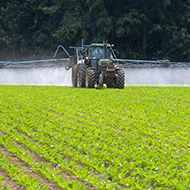Government approves use of bee-harming pesticide

Traces of neonicotinoid pesticide play havoc with bees' ability to forage and navigate.
The UK Government has approved the temporary use of the banned pesticide thiamethoxam in England to protect sugar beet seed against beet yellows virus.
Thiamethoxam belongs to a class of neonicotinoid pesticides that were banned in the UK and the EU in 2018 for agricultural use due to their harmful impact on bees.
Traces of these toxic chemicals in crop pollen or wildflowers play havoc with bees’ ability to forage and navigate. A recent study found that a single exposure to a neonicotinoid insecticide could significantly impact future generations’ ability to produce offspring.
It is the second year running that the Government has permitted the temporary use of a neonicotinoid chemical on sugar beet crops. Last year, however, bees were protected by a harsh winter that killed many aphids, meaning its threshold for use was not met.
Announcing the decision, environment secretary George Eustice said that farmers would be banned from planting any flowering crop where the product has been used within 32 months of treatment.
A Defra spokesperson said: “This decision has not been taken lightly and is based on robust scientific assessment. We evaluate the risks very carefully and only grant temporary emergency authorisations for restricted pesticides in special circumstances when strict requirements are met.
“Last year the threshold was not met so the authorisation was never exercised. Strict criteria remain in place meaning this authorisation will only be used if necessary.”
Environmental campaigners say the decision to allow the use of thiamethoxam comes despite the Government's own advisors recommending against its approval.
Minutes from the Expert Committee on Pesticides meeting state: ‘The Committee agreed with HSE’s evaluation that the requirements for emergency authorisation have not been met” and “on the basis of the evidence presented to ECP, the Committee agreed that it is unable to support an emergency authorisation under Article 53 of Regulation 1107/2009’.
The advisers also concluded that water pollution from the pesticide would harm river life.
Joan Edwards, director of policy and public affairs at The Wildlife Trusts, said: “The Government’s decision to allow farmers to use a banned chemical goes against the expert advice of its own Health and Safety Executive, and the Expert Committee on Pesticides.
“It’s a clear betrayal of promises made to protect the natural world and comes at a time when nature declines are worse than ever. Thiamethoxam is known to have a devastating effect on wildlife – a single teaspoon is toxic enough to kill 1.25 billion bees.
She continued: “Less than two months ago the Government adopted a legally binding commitment to halt the decline of wildlife by 2030 within its flagship Environment Act – the authorisation of this neonicotinoid flies in the face of this commitment and sounds a death knell for millions of bees and other insects.”
Sandra Bell, campaigner at Friends of the Earth, added: “Allowing a bee-harming pesticide back into our fields is totally at odds with ministers’ so-called green ambitions, not to mention directly against the recommendation of their own scientists. This decision comes just two months after the government enshrined in law a target to halt species loss by 2030.
“If it’s really serious about this commitment, the government, along with industry, must redouble efforts to find effective alternatives which help farmers keep pests under control, focusing on agroecological methods that work with nature, not against it.”



 The Animal and Plant Health Agency (APHA) has updated its online reporting service for dead wild birds.
The Animal and Plant Health Agency (APHA) has updated its online reporting service for dead wild birds.